Daily Vocabulary Words: List of Daily Used Words in Leading International Newspapers
Hi there. Welcome to this special section @ Wordpandit.
Our endeavour here is very simple: to highlight important daily vocabulary words, which you would come across in leading newspapers in the country. We have included the following newspapers in our selection:
• The New York Times
• The Washington Post
• Scientific American
• BBC
• The Guardian
• Psychology Today
• Wall Street Journal
• The Economist
We are putting in extensive work for developing your vocabulary. All you have got to do is be regular with this section and check out this post on a daily basis. This is your repository of words that are commonly used and essentially, we are posting a list of daily used words. Hence, this has significant practical application as it teaches you words that are used commonly in leading publications mentioned above.
Visit the website daily to learn words from leading international newspapers.
WORD-1: Contradictory
CONTEXT: Garbled language and contradictory statements are becoming common among establishment figures.
SOURCE: The Guardian
EXPLANATORY PARAGRAPH: Imagine you’re drawing a picture, and you say you’re going to use only blue, but then you start using red too. Contradictory is when things don’t match up or say opposite things, like saying you’ll use one color but then using another.
MEANING: Expressing the opposite or conflicting ideas; not consistent (adjective).
PRONUNCIATION: Con-tra-DIC-to-ry
SYNONYMS: Conflicting, Opposing, Inconsistent, Contrary, Antithetical, Divergent
USAGE EXAMPLES:
1. The witnesses gave contradictory statements during the trial.
2. The report contains contradictory information on the subject.
3. Their views on the matter were found to be contradictory.
4. Contradictory evidence made the case difficult to solve.
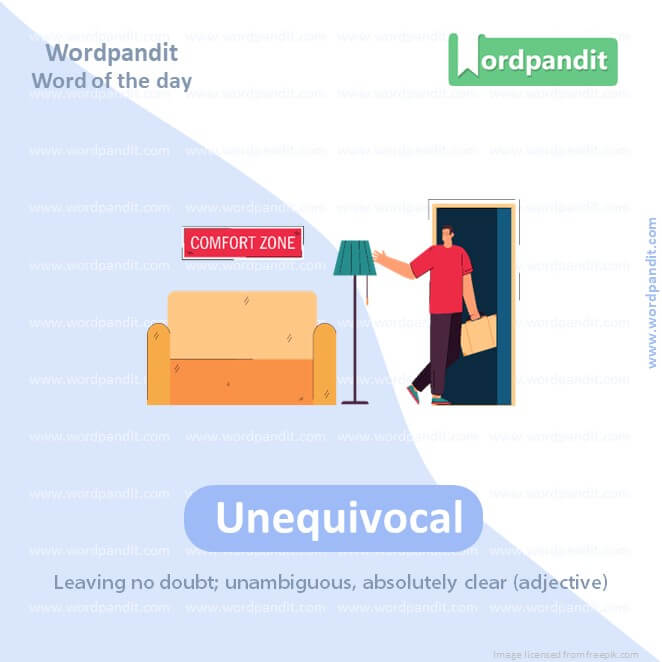
WORD-2: Unequivocal
CONTEXT: Nowhere are these contradictions clearer than when politicians express unequivocal support for Israel’s actions while also expressing concern for civilians in Gaza.
SOURCE: The Guardian
EXPLANATORY PARAGRAPH: Imagine you really, really want a chocolate ice cream and you tell your friend there’s no other ice cream you’d rather have. Unequivocal is when you’re super clear about what you want or believe, with no confusion or doubt.
MEANING: Leaving no doubt; unambiguous, absolutely clear (adjective).
PRONUNCIATION: Un-e-QUIV-o-cal
SYNONYMS: Clear, Unambiguous, Indisputable, Definitive, Explicit, Unmistakable
USAGE EXAMPLES:
1. Her answer was unequivocal; she said no.
2. The evidence was unequivocal, leading to a quick verdict.
3. He made an unequivocal apology for his actions.
4. The support for the proposal was unequivocal.
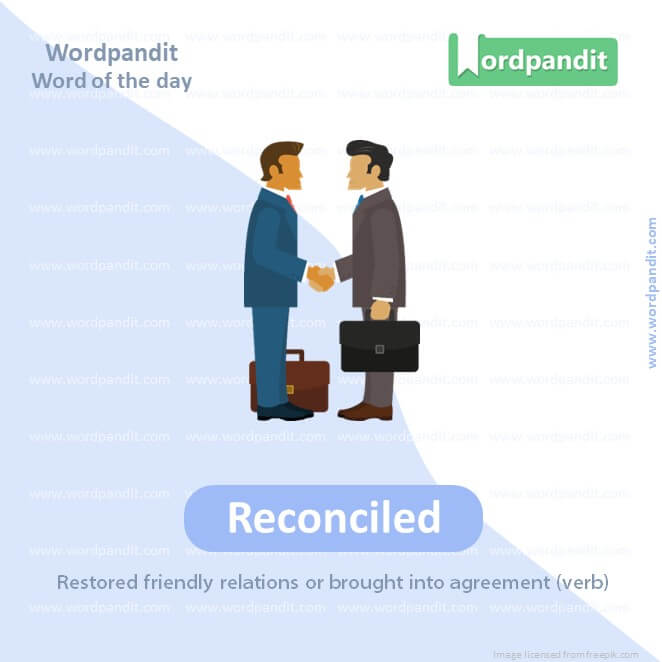
WORD-3: Reconciled
CONTEXT: This dissonance is a product of attempting to reconciled an irreconcilable position. The facts are simply too stark for anyone to confront them while plausibly continuing to support Israel’s actions in Gaza.
SOURCE: The Guardian
EXPLANATORY PARAGRAPH: Imagine you and your best friend had a big argument about which game to play and now you’re not talking. To reconcile is like making up and becoming friends again, finding a way to agree or be happy together after being upset.
MEANING: Restored friendly relations or brought into agreement (verb).
PRONUNCIATION: RE-con-cile
SYNONYMS: Resolve, Harmonize, Settle, Mend, Patch up, Bridge differences
USAGE EXAMPLES:
1. They tried to reconcile their differences through discussion.
2. The couple reconciled after a brief separation.
3. Efforts were made to reconcile the conflicting interests.
4. She reconciled with her old friend after many years.
WORD-4: Irreconcilable
CONTEXT: This dissonance is a product of attempting to reconcile an irreconcilable position. The facts are simply too stark for anyone to confront them while plausibly continuing to support Israel’s actions in Gaza.
SOURCE: The Guardian
EXPLANATORY PARAGRAPH: Imagine two friends who want to play different games and no matter how they try, they can’t agree on one game to play together. Irreconcilable is when people have differences that are so big, they can’t find a way to agree or come back together.
MEANING: Impossible to find agreement or compatibility between; so different that agreement is not possible (adjective).
PRONUNCIATION: Ir-re-CON-cil-a-ble
SYNONYMS: Incompatible, Inconsolable, Unresolvable, Unreconcilable, Irresolvable, Antagonistic
USAGE EXAMPLES:
1. Their differences were found to be irreconcilable, leading to a breakup.
2. Irreconcilable viewpoints prevented the committee from reaching a consensus.
3. The conflict was based on irreconcilable beliefs.
4. They faced irreconcilable challenges in their partnership.
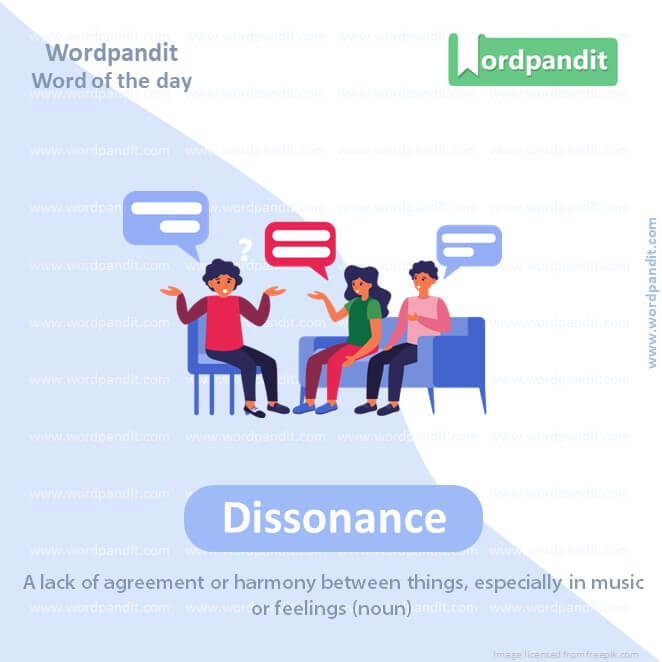
WORD-5: Dissonance
CONTEXT: This dissonance is a product of attempting to reconcile an irreconcilable position. The facts are simply too stark for anyone to confront them while plausibly continuing to support Israel’s actions in Gaza.
SOURCE: The Guardian
EXPLANATORY PARAGRAPH: Imagine you’re listening to music, and suddenly the notes start sounding wrong and uncomfortable together, like they don’t match. Dissonance is that feeling of tension or clash in music, or when things just don’t seem to fit right together, whether it’s sounds or ideas.
MEANING: A lack of agreement or harmony between things, especially in music or feelings (noun).
PRONUNCIATION: DIS-so-nance
SYNONYMS: Conflict, Discord, Disharmony, Strife, Clash, Inconsistency
USAGE EXAMPLES:
1. The dissonance between the parents’ expectations and the child’s interests was clear.
2. Musical dissonance can create a feeling of unease.
3. There was a noticeable dissonance in their relationship.
4. The dissonance among team members affected their performance.
WORD-6: Stark
CONTEXT: The facts are simply too stark for anyone to confront them while plausibly continuing to support Israel’s actions in Gaza.
SOURCE: The Guardian
EXPLANATORY PARAGRAPH: Imagine looking outside and seeing a tree with no leaves in the middle of winter, standing out against the snowy ground. Stark is when something is very clear and easy to see, often because it’s so different from everything around it, like that bare tree in the snowy landscape.
MEANING: In a way that is severe or obvious in appearance or outline (adverb).
PRONUNCIATION: STARK
SYNONYMS: Harsh, Bleak, Clear, Plain, Sharp, Bare
USAGE EXAMPLES:
1. The stark beauty of the desert impressed them.
2. There was a stark contrast between the rich and the poor areas of the city.
3. The room’s decor was stark and minimalist.
4. The difference in their opinions was stark.
WORD-7: Derangement
CONTEXT: The results border on derangement, such as when Nancy Pelosi told CNN that while some protesters are “spontaneous and organic and sincere”, calling for a ceasefire means giving voice to “Mr Putin’s message”.
SOURCE: The Guardian
EXPLANATORY PARAGRAPH: Imagine if someone took the pieces of your favorite puzzle and mixed them all up so they didn’t fit together anymore. Derangement is when things are so mixed up or disturbed that they don’t work right, like a puzzle that can’t be completed because the pieces are in the wrong order.
MEANING: A state of mental disturbance and disordered function (noun).
PRONUNCIATION: De-ran-ge-MENT
SYNONYMS: Madness, Insanity, Disorder, Chaos, Disruption, Unbalance
USAGE EXAMPLES:
1. The patient showed signs of mental derangement.
2. The derangement of the files caused confusion.
3. His behavior was indicative of a serious derangement.
4. The system’s derangement led to its failure.
WORD-8: Filibustering
CONTEXT: He has strong powers against filibustering; he can switch off any member’s microphone or even order his guards to remove any particularly unruly member.
SOURCE: The Guardian
EXPLANATORY PARAGRAPH: Imagine someone keeps talking and talking without stopping, so you can’t watch your favorite TV show because they won’t give you the remote control. Filibustering is like that but in politics, where someone keeps talking for a very long time to delay or stop decisions from being made.
MEANING: The act of prolonging speech or debate to delay legislative action (verb).
PRONUNCIATION: FIL-i-bus-ter-ing
SYNONYMS: Obstructing, Stalling, Delaying, Procrastinating, Hindering, Thwarting
USAGE EXAMPLES:
1. The senator was filibustering to prevent a vote on the bill.
2. Filibustering tactics were used to block the legislation.
3. They resorted to filibustering to draw attention to their cause.
4. The filibustering effort lasted for hours.
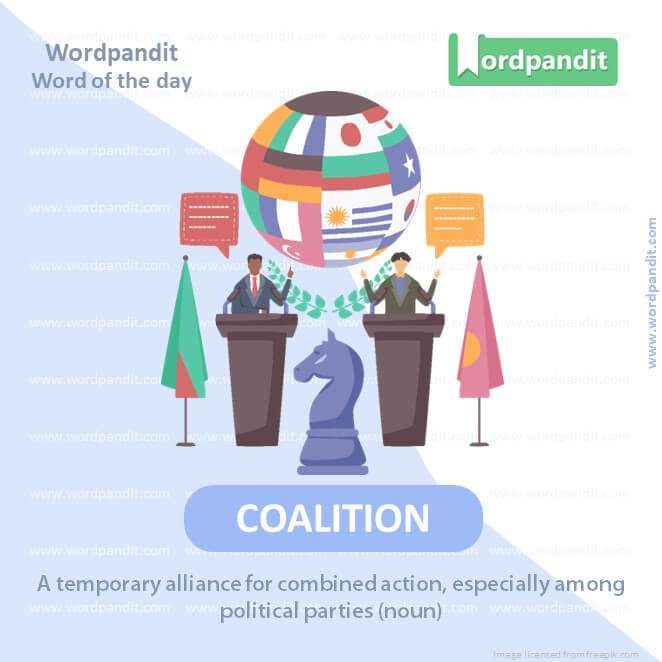
WORD-9: Coalition
CONTEXT: He launched a party called Poland 2050, which in 2023 forged a centre-right political alliance called Third Way. It joined forces with Tusk’s pro-Europe centrist Civic Coalition ahead of last October’s election.
SOURCE: The Guardian
EXPLANATORY PARAGRAPH: Imagine if different groups in your school, like sports teams and music clubs, decided to come together for a big project. A coalition is like that: a team made up of different groups or people who join forces to achieve a common goal.
MEANING: A temporary alliance for combined action, especially among political parties (noun).
PRONUNCIATION: Co-a-LI-tion
SYNONYMS: Alliance, Union, Partnership, Merger, Consortium, Confederation
USAGE EXAMPLES:
1. The parties formed a coalition government.
2. A coalition of environmental groups launched a campaign.
3. The coalition worked together to address the crisis.
4. They joined a coalition to promote community safety.
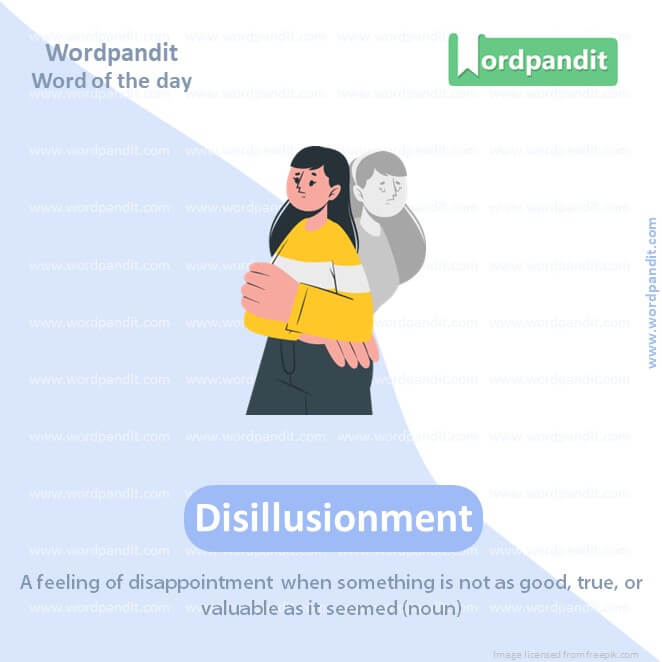
WORD-10: Disillusionment
CONTEXT: If Keir Starmer delivers frustration and disillusionment, the system we call democracy will yet again break its promise.
SOURCE: The Guardian
EXPLANATORY PARAGRAPH: Imagine believing that a magician’s rabbit really disappeared, but then you see the hidden door in the hat. Disillusionment is when you feel let down because you find out something isn’t as wonderful, perfect, or magical as you thought it was.
MEANING: A feeling of disappointment when something is not as good, true, or valuable as it seemed (noun).
PRONUNCIATION: Dis-il-lu-sion-ment
SYNONYMS: Disenchantment, Disappointment, Letdown, Discontent, Cynicism, Disbelief
USAGE EXAMPLES:
1. After the scandal, her disillusionment with politics grew.
2. The disillusionment among the fans was palpable when the movie failed to meet expectations.
3. His experience led to a deep sense of disillusionment.
4. The project’s failure caused disillusionment in the team.
Vocabulary Meaning
In the ocean of language learning, ‘vocabulary meaning’ is akin to the colorful coral reefs that add depth and vibrancy to communication. Yet, infusing our interactions with this vibrancy is often a challenge for many language learners. The crux lies in effectively deciphering and employing the ‘vocabulary meaning’.
Learning ‘vocabulary meaning’ isn’t about merely gluing words to their definitions. It’s about forming a deep understanding and connection with these words that transcends rote learning. To gain a comprehensive grasp of ‘vocabulary meaning’, one needs to navigate beyond textbook definitions and commit to exploiting diversified resources such as novels, films, music, articles, and digital content. This allows one to encounter vocabulary in a variety of contexts and actual usage, giving deeper insight into their meaning.
However, understanding ‘vocabulary meaning’ involves another essential aspect—memory retention. Techniques such as spaced repetition and the Leitner System offer effective methodologies to maintain and consolidate the ‘vocabulary meaning’. Additionally, leveraging mnemonic strategies can help etch words into your memory by linking them with unique stories or imagery that are personal and easily recallable.
Another way of mastering ‘vocabulary meaning’ is by immersing yourself in the language. Engage in regular conversations with native speakers if possible or utilize language exchange platforms to practice your skills. This not only bolsters your understanding of how the vocabulary is used but also helps articulate the ‘vocabulary meaning’ in the societal and cultural contexts.
In conclusion, gaining a robust grasp of ‘vocabulary meaning’ is a journey rather than an end goal. It requires dedication, perseverance and most importantly, a multi-faceted approach that includes diversified resources, effective memory strategies, and real-life application. With these strategies in place, the depths of ‘vocabulary meaning’ are no longer daunting but become an enchanting exploration of language.











